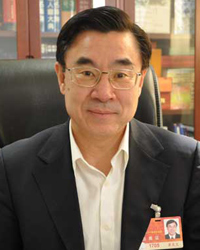|
 |
|
(CHINA.ORG.CN) |
Huang Youyi, a member of the CPPCC (The Chinese People's Political Consultative Conference) National Committee and vice president of China International Publishing Group, talked exclusively to China.org.cn about the problems China faces in getting its message across to the world.
"In the first 30 years of China's opening-up, we concentrated on manufacturing, foreign trade and investment. But things have changed recently. We are beginning to realize the importance of cultural exports," Huang said.
"In the past, Chinese culture was expressed in acrobatic performances or Peking Opera shows. But now Chinese people are making their voices heard in international forums and Chinese publishing houses are publishing books overseas. The volume and variety of cultural exports have grown enormously."
But China faces challenging problems, Huang said. First of all, few of China's international communicators have lived abroad, and their understanding of overseas cultures and societies is limited. Secondly, the quality of translation is far from perfect. Chinese is not widely spoken outside China, so good translators are essential to carry the country's message overseas. But there are simply not enough qualified translators. Perhaps most importantly, China also needs to change its approach. "We must master the rules of international dialogue if we are to successfully communicate our ideas to people from different cultures," Huang said.
China is trying hard to fill the talent gap. "Universities and colleges are setting up master's degree programs on international cultural communication. They want to train students who are proficient in both foreign languages and Chinese culture," Huang said. "And Chinese media organizations are increasingly investing in training staff abroad."
Huang gave an example of the misconceptions people have about China. He received a letter from an American reader asking him why the U.S. is flooded with "Made in China" goods while Chinese people buy hardly any American products. Huang replied: "I brush my teeth with Colgate toothpaste, eat oatmeal from Australia, drive a Buick to work, and greet a colleague who carries a Coach bag."
"The fact is that China is actually consuming products from everywhere. Sometimes we just need to set out the facts and let the readers judge for themselves," Huang said.
Huang thinks telling the individual stories of Chinese people is the best way to communicate the real China to the world. "They are easier for foreign readers to accept than abstract concepts. After all, we have a lot in common. Both Chinese and Americans want their children to go to good schools, find good jobs and live a happy life," Huang said.
Huang believes the traditional idea of "harmonious yet different" (He Er Bu Tong) best expresses the essence of Chinese culture in today's world. "Though the phrase consists of just four Chinese characters, it contains an enormous amount of information. The ideas of harmony and cooperation come from China's traditional culture but also apply to its modern economy, society and foreign policy. This is something that sets Chinese culture apart from western culture," he said.
Huang is optimistic about China's ability to get its message across, but admits there is still a long way to go. "In the 1970s, there was practically nothing about China in foreign newspapers. But now, you see several articles on the front page of New York Times every day. Our task is to explain China to the world. We are still at an early stage, but our progress will speed up as time goes by," Huang said.
As vice chairman of the Translators Association of China Huang is proposing to this year's CPPCC that legal standards should be laid down to regulate translation. Translation companies are currently completely unregulated and the result is that they often deliver poor quality work and charge widely varying prices. Huang said solving these problems would help the translation industry support China's economic and cultural activities.
(China.org.cn March 4, 2011) | 